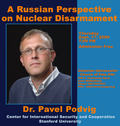 Between them, Russia and the United States have more than 95 percent of all the world's nuclear weapons, so any progress toward nuclear disarmament would require significant reduction of the Russian nuclear arsenal. The talk, by Dr. Pavel Podvig, will discuss the current status and prospects of the Russian nuclear forces, attitudes toward nuclear disarmament, and the issues that are on the agenda of the U.S.-Russian disarmament dialog -- new arms control treaty, missile defense, and nuclear nonproliferation.
Between them, Russia and the United States have more than 95 percent of all the world's nuclear weapons, so any progress toward nuclear disarmament would require significant reduction of the Russian nuclear arsenal. The talk, by Dr. Pavel Podvig, will discuss the current status and prospects of the Russian nuclear forces, attitudes toward nuclear disarmament, and the issues that are on the agenda of the U.S.-Russian disarmament dialog -- new arms control treaty, missile defense, and nuclear nonproliferation.Who: Dr. Pavel Podvig
Stanford University, Center for International Security and Cooperation
What: A talk entitled "A Russian Perspective on Nuclear Disarmament"
Where: Main Hall, Unitarian Universalist Church of Palo Alto
When: Thursday, September 17, 7:00 PM
Cost: Free
Abstract:
Between them, Russia and the United States have more than 95 percent of all the world's nuclear weapons, so any progress toward nuclear disarmament would require significant reduction of the Russian nuclear arsenal. The talk will discuss the current status and prospects of the Russian nuclear forces, attitudes toward nuclear disarmament, and the issues that are on the agenda of the U.S.-Russian disarmament dialog -- new arms control treaty, missile defense, and nuclear nonproliferation.
Biography
Dr. Podvig, who is currently acting associate director for research at Stanford's Center for International Security and Cooperation, is one of the formal endorsers of the celebrated 2008 Wall Street Journal op-ed by Shultz, Perry, Kissinger, and Nunn: "Toward a Nuclear-Free World."
Dr. Podvig received his degree in physics from the Moscow Institute of Physics and Technology (MIPT), and his PhD in political science from the Moscow Institute of World Economy and International Relations. Since 2001, he has been a member of the Board of Directors of the Bulletin of the Atomic Scientists. He is the editor of the book Russian Strategic Nuclear Forces (MIT Press, 2001). In recognition of his work, the American Physical Society awarded him the Leo Szilard Lectureship Award of 2008. His current research focuses on the Russian strategic forces and nuclear weapons complex, as well as technical and political aspects of nuclear nonproliferation, disarmament, missile defense, and U.S.-Russian arms control process.